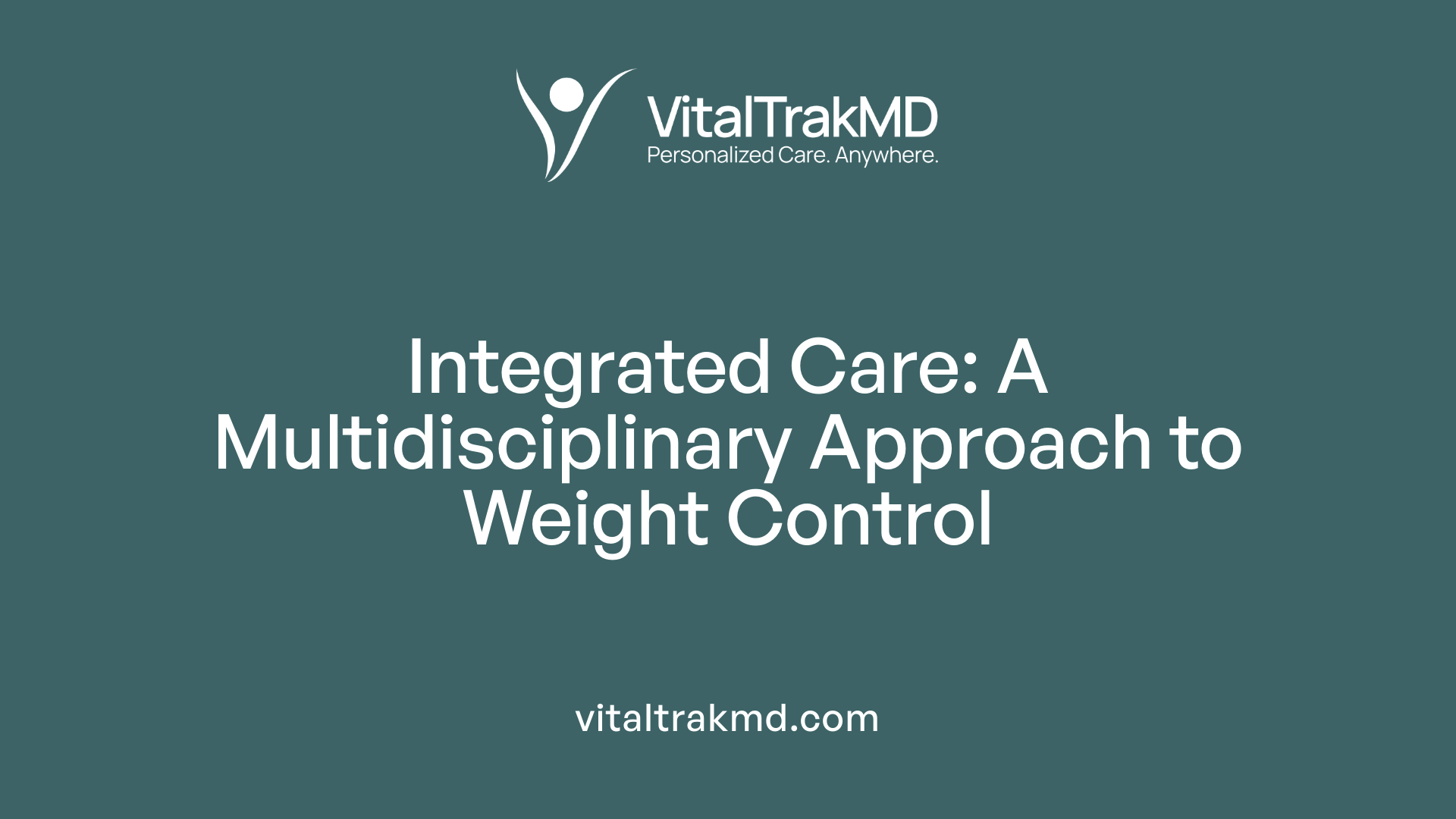How Hybrid Care Supports Midlife Adults Struggling with Obesity

Understanding the Shift Toward Hybrid Weight Management Strategies
Obesity among midlife adults is a complex and chronic health issue that demands comprehensive treatment strategies. Recent advancements in hybrid care models—combining in-person and digital health interventions—are transforming how healthcare providers approach weight management in this demographic. This article explores how hybrid models support sustainable weight loss, improve health outcomes, and address the unique challenges faced by middle-aged populations.
The Fundamentals of Obesity Management in Midlife

What treatment options and strategies are recommended for obesity management in midlife adults?
Managing obesity during midlife (ages 40-65) demands a personalized and comprehensive approach. Combining various strategies increases the chances of achieving and maintaining weight loss, while addressing health risks associated with obesity.
Lifestyle modifications form the foundation of treatment. This includes adopting a nutritious, calorie-controlled diet with an emphasis on fruits, vegetables, whole grains, and lean proteins. Regular physical activity—aiming for at least 150 minutes weekly—also plays a vital role.
Behavioral therapies such as counseling, motivational interviewing, and support groups are essential for tackling emotional and behavioral factors that contribute to weight gain. These interventions help improve adherence to lifestyle changes and develop coping strategies for challenges.
When lifestyle modifications alone do not produce sufficient results, pharmacotherapy options are considered. Medications like semaglutide, liraglutide, or naltrexone-bupropion have been approved for weight management. These drugs target appetite regulation and satiety, often leading to a weight loss of approximately 10-15% over a year, and are most effective when used alongside ongoing lifestyle efforts.
For individuals with severe obesity or those resistant to other treatments, surgical options may be appropriate. Bariatric procedures, including gastric bypass or sleeve gastrectomy, can result in 60-80% weight reduction. Surgery requires lifelong lifestyle adjustments and psychological readiness but can also lead to remission of conditions like type 2 diabetes.
Community and systemic interventions provide a supportive environment by promoting access to healthy foods, safe spaces for exercise, and comprehensive healthcare services. These broader measures are vital for creating sustainable health benefits and reinforcing individual efforts.
Overall, combining these strategies in an integrated care plan optimizes long-term outcomes and enhances quality of life for midlife adults with obesity.
Multidisciplinary Approaches for Effective Long-Term Weight Control

What are some effective strategies and treatment options for obesity management in midlife adults, including multidisciplinary approaches?
Managing obesity in adults during mid-life (ages 40-65) can be complex, requiring a coordinated effort from various health disciplines. The most successful strategies incorporate a comprehensive approach that combines dietary changes, increased physical activity, behavioral therapy, and, when appropriate, medications or surgical procedures.
Dietary adjustments are fundamental. Personalized nutrition plans focus on sustainable, calorie-controlled diets rich in whole foods, fruits, vegetables, and lean proteins. Even modest weight loss of 5-10% can significantly improve health outcomes, reducing risks of heart disease, stroke, and diabetes.
Physical activity is equally vital. Regular exercise—such as walking, cycling, or structured workouts—helps burn calories, improve cardiovascular health, and strengthen muscles. Engaging in activities that participants find enjoyable reinforces consistency and motivation.
Behavioral strategies often include cognitive-behavioral therapy (CBT), motivational interviewing, and goal setting to promote lasting habits. Continued self-monitoring through diaries or mobile apps helps individuals stay accountable while fostering awareness of eating and activity patterns.
Psychological support addresses emotional factors influencing eating behaviors, offering tools to cope with stress, boredom, or emotional eating. Support groups and counseling can provide social reinforcement and emotional resilience.
Coordination among healthcare professionals—such as physicians, dietitians, psychologists, and exercise physiologists—is crucial. These experts collaborate to develop personalized care plans that address medical, psychological, and social circumstances.
Recent advances involve the integration of medications like GLP-1 receptor agonists, which help regulate appetite and improve metabolic health. In severe cases, bariatric surgery may be considered, offering significant long-term weight loss and remission of conditions like type 2 diabetes.
Combining these strategies within a multidisciplinary framework ensures flexible, scalable, and sustainable management. Such an approach improves not only weight outcomes but also overall health and quality of life for middle-aged adults.
| Strategy | Description | Additional Notes |
|---|---|---|
| Dietary Adjustments | Personalized, calorie-controlled diet plans | Focus on sustainable, nutrient-rich foods |
| Physical Activity | Regular aerobic and resistance exercises | Enhances cardiovascular and muscular health |
| Behavioral Therapy | CBT, motivational interviewing, goal setting | Supports habit formation and emotional regulation |
| Psychological Support | Counseling, support groups | Addresses emotional and psychological factors |
| Medical and Surgical Options | Medications and bariatric surgery | Used when lifestyle changes alone are insufficient |
Ultimately, a tailored, patient-centered plan, maintained with ongoing support and adjustments, offers the best chance for long-term success in obesity management among midlife adults.
Technological Innovations in Hybrid Care: Enhancing Engagement and Monitoring

How can digital health tools, remote monitoring, and telemedicine support weight management in midlife adults?
Digital health tools, remote monitoring, and telemedicine are transforming weight management for adults in midlife by making care more accessible, personalized, and continuous. Wearable devices such as fitness trackers monitor physical activity, heart rate, and sleep patterns in real-time, providing users and healthcare providers with valuable data.
Mobile health apps facilitate self-monitoring of diet, physical activity, and weight changes, helping individuals stay motivated and accountable. These tools often include features like reminders, goal setting, and educational content, which reinforce healthy behaviors.
Remote monitoring devices, such as Bluetooth-connected scales and sensors, transmit health metrics directly to healthcare teams. This real-time data allows for timely feedback and adjustments to treatment plans, increasing the chances of sustained weight loss.
Artificial Intelligence (AI) and machine learning enhance these digital platforms by offering personalized treatment recommendations based on individual patterns and responses. AI-driven algorithms can predict potential setbacks and suggest micro-interventions to maintain progress.
Telehealth services, including video consultations and virtual coaching, reduce barriers related to transportation and geographic location. They enable regular check-ins, behavioral counseling, and education, ensuring ongoing support. This continuity is crucial for long-term weight management.
Despite these advantages, challenges like digital literacy, privacy concerns, and equitable access must be addressed. Not all individuals have the same comfort or resources to use these technologies effectively.
In summary, integrating digital health tools, remote monitoring, and telemedicine creates a comprehensive support system that fosters engagement, accountability, and personalized care—all vital for successful weight management in midlife adults.
The Role of Hybrid Care in Managing Obesity and Comorbidities

How does hybrid care support midlife adults in managing obesity and related comorbidities?
Hybrid care models combine face-to-face interactions with digital health tools, offering a flexible and accessible approach suited for midlife adults managing obesity. Typically, these programs start with initial in-person sessions with healthcare professionals, establishing trust and providing personalized guidance. In the subsequent phases, participants use telehealth services, mobile apps, or remote monitoring devices to track progress, receive reminders, and obtain real-time feedback. This structure ensures continuous engagement, which is essential for behavior change.
Behavioral theories, such as Social Cognitive Theory, underscore the importance of self-efficacy and observational learning, both of which are supported through digital self-monitoring and virtual coaching. The integration of pharmacotherapy, especially GLP-1 receptor agonists, can further enhance weight loss and metabolic health. When incorporated into a hybrid model, medication usage is complemented by ongoing behavioral support, promoting adherence and long-term success.
Most studies show that hybrid programs achieve comparable outcomes to traditional in-person interventions. Participants often see significant weight reductions, typically ranging from 3.9 to 8.2 kg, along with improvements in waist circumference and BMI. Additionally, glycemic control measured by A1C levels tends to improve, especially when hybrid care is used for individuals with diabetes and obesity.
This care model also emphasizes accountability and personalization. Virtual check-ins facilitate tailored feedback and goal setting, accommodating individual preferences and lifestyle constraints. Such flexibility encourages sustained participation, crucial for managing not only weight but also associated health risks like cardiovascular disease and type 2 diabetes.
Overall, hybrid care provides a comprehensive, adaptable, and effective strategy for addressing the complex needs of midlife adults, supporting sustained behavioral, physiological, and psychological health improvements.
Addressing Obesity as a Chronic Disease: Policy and Ethical Considerations
What are policy considerations and holistic approaches to obesity care for middle-aged and older adults?
Managing obesity effectively in middle-aged (40-65) and older adults requires comprehensive policies that support multidisciplinary, personalized care strategies. These policies should promote integrated guidelines tailored to older populations, emphasizing behavioral therapy, nutritional guidance, and physical activity.
A crucial aspect is improving access to various treatment options, including lifestyle programs, medications like GLP-1 receptor agonists, and surgical procedures such as bariatric surgery. Ensuring coverage through Medicare and Medicaid can reduce financial barriers, making these options accessible to more individuals.
Holistic care models that address physical health, mental well-being, social support, and environmental factors are essential. Incorporating frameworks like the 4Ms—What matters, Medicine, Mentation, and Mobility—can optimize care by focusing on individual priorities and health conditions.
Reducing societal stigma surrounding obesity is an important policy goal. Promoting respectful language and positive messaging in healthcare and advertising fosters a supportive environment for behavioral change.
Cultural competence is vital, as treatment approaches should respect diverse backgrounds and beliefs. Tailoring interventions to cultural contexts increases engagement and effectiveness.
Addressing social determinants of health—such as housing, neighborhood resources, and access to healthy foods—can create supportive environments that facilitate sustained weight management.
Finally, strengthening collaboration between healthcare systems and community-based services ensures continuity of care. Evidence-based strategies, including long-term behavioral support, stress management, sleep health, and addressing social factors, are critical for sustainable obesity management.
Summary Table: Policy and Holistic Approach Aspects in Obesity Care for Middle-aged and Older Adults
| Aspect | Description | Example Initiatives |
|---|---|---|
| Treatment Accessibility | Ensure broad treatment options covered by insurance | Coverage for lifestyle programs, medications, surgeries |
| Personalized Care | Tailor interventions based on individual needs | Use of BMI, metabolic measures, preferences |
| Reducing Stigma | Promote respectful communication and imagery | Public campaigns, provider training |
| Cultural Competency | Respect for diverse backgrounds | Culturally adapted diet and activity programs |
| Addressing Social Determinants | Improve living environments | Neighborhood improvements, food access programs |
| Interprofessional Collaboration | Team-based care | Integration of dietitians, exercise physiologists, mental health providers |
| Evidence-based Support | Long-term behavioral strategies | Cognitive-behavioral therapy, stress management |
By implementing these policies and adopting a holistic, patient-centered approach, healthcare systems can better support older adults in managing obesity effectively, improving health outcomes and quality of life.
Supporting Psychological Wellbeing and Motivation in Weight Loss Journeys
What psychological interventions and strategies are effective in supporting long-term weight management in midlife adults?
Psychological support plays a crucial role in helping midlife adults manage weight effectively over the long term. Interventions such as cognitive–behavioural therapy (CBT), motivational interviewing (MI), acceptance and commitment therapy (ACT), and general behavioral therapy are commonly used to address the emotional and psychological challenges associated with obesity.
CBT focuses on changing negative thought patterns and behaviors related to eating and activity, empowering individuals to develop healthier habits. MI helps enhance motivation and resolve ambivalence about lifestyle changes, encouraging a stronger commitment to weight management goals. ACT promotes acceptance of health-related behaviors and emphasizes mindfulness to reduce emotional eating.
Supportive strategies also include the use of support groups, peer networks, and community resources that foster social accountability and provide encouragement. Regular self-monitoring of progress, setting realistic goals, and celebrating milestones can boost confidence and sustain motivation.
Tailoring psychological approaches to each person’s unique needs increases the chances of success. This personalized support helps address emotional barriers and promotes resilience, making it easier for adults in midlife to stick with their weight management plans over time.
The Impact of Obesity on Aging and Older Adults
How does obesity affect aging and the health of older adults?
Obesity plays a significant role in shaping the health outcomes of aging individuals. As people grow older, their bodies undergo physiological changes that can be worsened by excess weight. For example, obesity often leads to decreased mobility due to joint stress and musculoskeletal issues, making everyday activities more difficult.
Furthermore, older adults with obesity are at an increased risk of developing chronic illnesses such as cardiovascular disease, type 2 diabetes, and certain types of cancer. The accumulation of excess fat also heightens the likelihood of functional decline and frailty, which can impair independence and reduce quality of life.
Managing obesity in late life demands a comprehensive, team-based approach. This involves healthcare professionals from various disciplines, including dietitians, exercise physiologists, psychologists, and social workers. Such interprofessional care considers the individual's unique health conditions, physical capabilities, and social circumstances.
Recognizing obesity as a chronic, lifelong condition emphasizes the importance of sustained, personalized, and evidence-based interventions. This approach not only targets weight reduction but also aims to improve overall health, functional status, and longevity, promoting healthier aging trajectories.
Creating Supportive Environments for Obesity Prevention and Management
What systemic and environmental strategies support effective obesity care among middle-aged populations?
Developing supportive environments is crucial to help middle-aged adults manage and prevent obesity. These strategies focus on creating community settings that make healthy choices easier and more accessible.
One of the primary approaches involves establishing community resources such as parks, walking trails, outdoor gyms, and recreation centers. These facilities promote physical activity by providing safe, attractive spaces where people can exercise regularly. Accessibility is key: ensuring that these resources are within walking distance or easily reachable by public transportation encourages more frequent use.
In addition to physical activity infrastructure, access to nutritious foods plays a vital role. Local markets, grocery stores, and urban planning initiatives can increase the availability of fresh fruits, vegetables, and healthy options. Policies that support the development of supermarkets in food deserts, subsidies for healthy foods, and urban agriculture projects help promote better dietary choices.
Addressing broader social determinants of health, like housing stability, transportation, and income, significantly influences obesity risk and management. Stable housing allows individuals to maintain consistent routines that support healthy living. Improved transportation options enable easier access to gyms, markets, and healthcare facilities, reducing logistical barriers.
Policy initiatives should also aim to create environments that foster inclusivity and support community engagement. Collaborations among public health agencies, local governments, schools, and healthcare providers are essential. These partnerships can develop targeted interventions that reflect local needs, ensuring residents have the resources, education, and motivation to adopt healthier behaviors.
Furthermore, urban planning that minimizes the presence of fast-food outlets while promoting walkable neighborhoods can dissuade unhealthy eating habits and sedentary lifestyles. Incorporating features like bike lanes and safe pedestrian crossings supports active transport, contributing to weight management.
In summary, systemic and environmental approaches—such as enhancing community infrastructure, improving food access, and addressing social barriers—are effective strategies to combat obesity in middle-aged populations. Such efforts require coordinated policies and community involvement to create sustainable, health-promoting environments.
A Forward-Looking Perspective on Obesity Care for Midlife Adults
The integration of hybrid care models into obesity management offers a promising pathway toward more accessible, personalized, and effective treatment strategies for midlife adults. By combining in-person and digital approaches, healthcare providers can better address the multifaceted nature of obesity—accounting for behavioral, physiological, and social factors. Policy reforms, socio-environmental support, and innovations in technology collectively contribute to a more holistic and equitable approach. As research continues to evolve and new pharmacotherapies emerge, the future of obesity care for middle-aged and older adults appears more capable of fostering sustained health and improved quality of life for this vulnerable population.
References
- Potential role of hybrid weight management intervention: A scoping ...
- Hybrid model of intensive lifestyle intervention is potentially effective ...
- Obesity Management During Mid-Life - MedCentral
- “I Was Having My Midlife Fat Crisis”: Exploring the Experiences and ...
- Obesity and the Promise of Modern Medicine: A Physician's ...
- Psychological interventions for weight reduction and sustained ...
- Experts Develop Strategies for Successful Care of Older Adults with ...
- How to Improve Obesity Care for Older Adults
Recent articles
Want to Feel Better and Live Healthier?
Join hundreds of patients taking control of their health with personalized care that fits their life – not the other way around.
Rated 4.8/5 by 32+ customers







